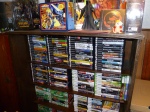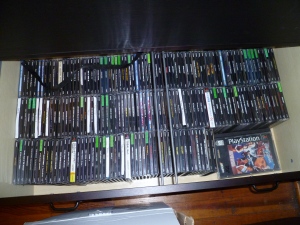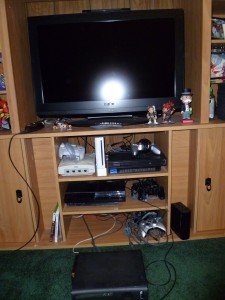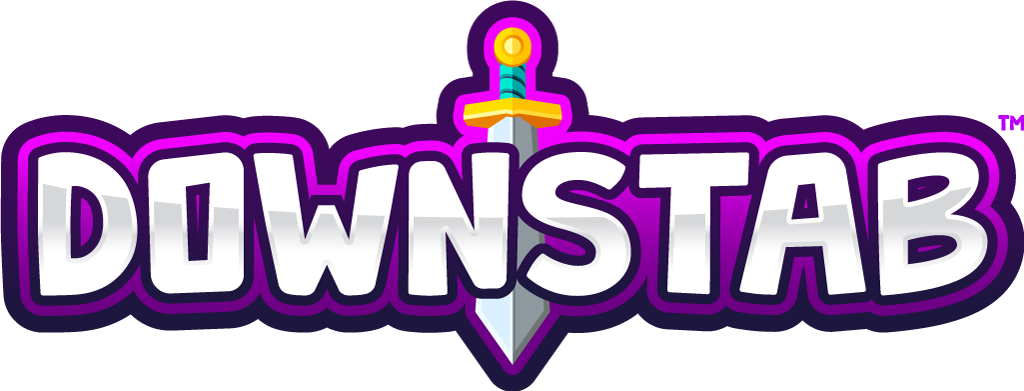 One of the most exciting part about being a gamer is the joy of finding a new game. It’s always great when a new title comes out, especially for a series you’ve played in the past and enjoyed (like Marvel vs. Capcom 3), but I’m talking about when you find an older game. One you’ve been looking to find for a long time. One that might be a rare spectacle in and of itself. These are the exciting moments I’m talking about. After eight or so years, I think I’ve amassed quite a collection of titles, and I’ve learned a good deal from my experiences. If you’re thinking of starting a collection, already have a pile of games sitting around, or just want to learn the best ways to get the games you’re looking for, this article is for you.
One of the most exciting part about being a gamer is the joy of finding a new game. It’s always great when a new title comes out, especially for a series you’ve played in the past and enjoyed (like Marvel vs. Capcom 3), but I’m talking about when you find an older game. One you’ve been looking to find for a long time. One that might be a rare spectacle in and of itself. These are the exciting moments I’m talking about. After eight or so years, I think I’ve amassed quite a collection of titles, and I’ve learned a good deal from my experiences. If you’re thinking of starting a collection, already have a pile of games sitting around, or just want to learn the best ways to get the games you’re looking for, this article is for you.
1) Research where to purchase your games and the average price the game goes for online
Here’s the most important thing you can remember about video game hunting: DON’T buy a game immediately upon seeing a copy! Research a few things before going out: What places sell the game, how does the game sell online, and do I know anyone that has the game that can sell it to me are all great questions to start with. I spend a good deal of time perusing video game shelves, not looking for anything in particular, until something catches my eye. I usually don’t buy it at that moment (unless the price is right), but I go home and research that title. Some websites (like GameSpot) list similar games to the one you’re looking at, and this can be a great way to learn about new games. Knowledge about titles can be a big help in fishing for those rare gems other people skip over.
2) Places to go to find what you’re looking for
Basically there’s three types of places to go. Let’s list them off one by one:
– Primary Retailers (GameStop, Toys R Us, Best Buy): These are the places that will always carry the newest games. When looking for a new game fast, there’s really no place better to shop. GameSpot offers a rewards program to frequent buyers, and this can be beneficial if you’re buying a lot of games. All these stores also offer decent selections of used titles as well.
– Used game stores (GameStop, Disc Replay, Game Xchange, Local): Used game stores are my go-to places to buy most games. GameStop obviously is the most widely known, but if you’re looking for PS1/DreamCast and older, used stores are the best. Disc Replay is one of my personal favorites, with great prices and selections of just about everything. Game Xchange is similar in fashion. Hidden stores that sell used are scattered about, and you might find one locally if you’re lucky.
– Premium stores (Online, Amazon, eBay): Usually a last resort, buying online is probably the easiest way to get games, but the least fun and most expensive. Some of the fun in searching for games is, well, the search. eBay is a great way to start a collection (try searching for “Used video game lot” and see your collection grow substantially), but not the best for prices. Most online stores charge a bit higher than you’d pay if you find the game in store, and the shipping charge hurts the wallet as well. If you absolutely have to have a game, then going online is a fine choice, but otherwise I advise staying away.

3) Buy at the right time
New games will always get cheaper, but strangely old games sometimes get more expensive over time. The key to buying smart is purchasing at the right time. Take advantage of GameStop’s buy 2 get 1 free sales, or Disc Replay’s buy 5 get the 6th free everyday sale. Oftentimes reaping the benefits of these sales is outstandingly rewarding: I picked up all three Fatal Frame games last week when GameStop’s PS2 titles were all 50% off. Seriously, this is the way to go to save the most cash.
4) Have a goal in mind when buying
It may sound silly, but it’s best to shop for video games with an end goal in mind. Personally I’m trying to purchase every U.S. released Sega DreamCast game, and it’s been super fun trying to find every game. Buying games willy-nilly will leave you with fragmented collections, shit you probably don’t even want, and an empty wallet. Some people like to buy every game in a series, or all the games by a certain company or for a certain system. Perhaps that’s a place for you to start. Goals make collecting have more purpose than simply buying a piece of plastic or data disc.

5) Log your collection
Even if you’re not collecting games, if you’ve been playing for some time it might get a little troublesome to remember all your games. And if you are collecting I’d be impressed if you could remember every game you own. That’s why it’s important to log your games in some form. I use a basic Word document on my computer, as well as iCollect Video Games, an app for my iPhone. The Word document (or equally helpful in an Excel spreadsheet) is an easy way to log games. I like using the iPhone app as well, because it’s a great way to see what I have on the go (or in the game store itself!). Whatever method you use that works for you is great, just use something.
6) Give it time and be willing to spend
Two things here: collecting games isn’t cheap. You can expect to pay a good amount of cash for each game you buy, depending on what system you are purchasing for. Having a nice source of income is essential: the last thing I want is for a gamers entire collection to go for sale online due to financial issues. And also don’t get too ahead of yourself; give it some time. You might want to buy Castlevania: Symphony of the Night for $25 black label at a store the first time you see it, but you know you can get it cheaper (I got mine for $12 in great condition) if you just wait. Part of the fun is not only finding the games, but getting the best possible price on them.
7) Play the games!
If there’s something I’ve discovered from collecting games that I never thought would happen it would be that I don’t play nearly as much as I should. I have upwards of 900 games in my collection (more on that next time) and I’ve played roughly 2/3 or them, beating much less than that. Video game collecting is a rare hobby in that you can get hundreds, thousands, and easily more hours of entertainment out of the items you are collecting if you actually play them. Don’t forget that. Video games are meant to be played and enjoyed like any other toy, so pop those cartridges/CDs/DVDs/Blu-Rays in and have some fun!
Well I hope you learned something about game collecting from this little article. I have had loads BOATloads of fun collecting games and wanted to let my readers know about my hobby while giving them some advice. I get incredible joy out of finding and purchasing games and hope you all do too! Happy hunting!
Laters,
Jsick






This Post Has 6 Comments
Good article, I abide by these like laws! Have you ever read Tips & Tricks? It’s an older gaming magazine with a good monthly selection devoted to collectors. I loved it and it turned me into a collector and provided a lot of valuable information.
Actually, yes, I did subscribe and read Tips N Tricks. I really liked that magazine! I remember the Collector’s Corner (Was that what it was called?). I marveled at the crazy collections some people had, and that was definitely something that started me in collecting too.
Great post, man. My collection is a fraction of what it used to be, but nothing beats the thrill of finding an awesome deal. It looks like there are a bunch of Disc Replay stores in the ‘burbs over here, so I may have to take a day trip out that way sometime (sucks not having a car, though).
There is one retro video game shop in the city that I know about, but they mark up their prices quite a bit. I love supporting local businesses, but I am not going to pay twice as much just for convenience.
Pingback: What Makes A Game “Rare”? « SlickGaming
Pingback: Sunday Roundup: 1/8/12 « SlickGaming
Pingback: Sunday Roundup: 7/15/12 « SlickGaming
Comments are closed.